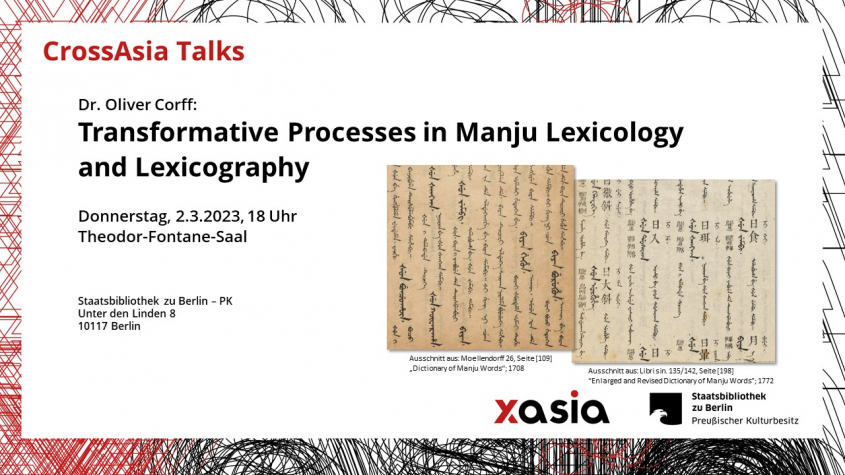Transformative Processes in Manju Lexicology and Lexicography
(See English below)
Wir freuen uns Ihnen den Vortrag von Dr. Oliver Corff mit dem Thema „Transformative Processes in Manju Lexicology and Lexicography“ am Donnerstag, den 2. März 2023 ab 18 Uhr im Theodor-Fontane Saal (Unter den Linden 8, 10117 Berlin) ankündigen zu dürfen.
The Han-i araha Manju gisun-i buleku bithe (Dictionary of Manju Words) of 1708, offering approx. 12,100 entries, is a major milestone in Manju lexicology and lexicography as it offers precise definitions of the meaning of Manju words, and beyond that, the concept and structure of knowledge and thought in the Manju world of the Qing empire.
Its successor is the Han-i araha nonggime toktobuha Manju gisun-i buleku bithe (Enlarged and Revised Dictionary of Manju Words) of 1772, which offers approx. 18,655 entries, an apparent increase by more than 50% which, at first glance, confirms the word nonggime (“enlarged”) in the title of this dictionary.
A closer inspection of the dictionary of 1708 reveals that many entries have more than one definition. Next to A be, B sembi (“A is called B”), we find definitions like A be, B sembi. geli C be, inu B sembi (“A is called B. In addition, C is also called B”), while alternatives with the same meaning are given as geli D seme gisurembi (“also said as D”). In fact, the secondary definitions and alternatives comprise many of those lemmata which are found as entries in their own right in the Enlarged and Revised Dictionary of 1772.
The process of editing the Enlarged and Revised Dictionary thus did not exhaust itself in adding new words, but was very much an effort to deconvolute and restructure the semantic foundation of the lexicon without departing too far from the original concept of the dictionary of 1708, as captured in the word toktobuha (“revised”).
With the help of quantitative measures to describe the “edit distance” between the two dictionaries it becomes possible to study the process of how convoluted homonyms and polysemes in the dictionary of 1708 unfold into the rigid fabric of the dictionary of 1772.
Die Vortragssprache ist Englisch. Wir bitten Sie um Voranmeldung für den Vortrag unter: ostasienabt@sbb.spk-berlin.de und eine kurze Mitteilung falls Sie einen barrierefreien Zugang benötigen. Die Veranstaltung wird gefilmt.*
Der Vortrag wird darüber hinaus via Webex gestreamt und aufgezeichnet. Sie können am Vortrag über Ihren Browser ohne Installation einer Software teilnehmen. Klicken Sie dazu unten auf „Zum Vortrag“, folgen dem Link „Über Browser teilnehmen“ und geben Ihren Namen ein.
Alle bislang angekündigten Vorträge finden Sie hier. Die weiteren Termine kündigen wir in unserem Blog und auf unserem Twitteraccount an.
—
We are pleased to announce the lecture of Dr. Oliver Corff with the topic „Transformative Processes in Manju Lexicology and Lexicography“ on Thursday, March 2, 2023 from 6 pm in the Theodor-Fontane Saal (Unter den Linden 8, 10117 Berlin).
The Han-i araha Manju gisun-i buleku bithe (Dictionary of Manju Words) of 1708, offering approx. 12,100 entries, is a major milestone in Manju lexicology and lexicography as it offers precise definitions of the meaning of Manju words, and beyond that, the concept and structure of knowledge and thought in the Manju world of the Qing empire.
Its successor is the Han-i araha nonggime toktobuha Manju gisun-i buleku bithe (Enlarged and Revised Dictionary of Manju Words) of 1772, which offers approx. 18,655 entries, an apparent increase by more than 50% which, at first glance, confirms the word nonggime (“enlarged”) in the title of this dictionary.
A closer inspection of the dictionary of 1708 reveals that many entries have more than one definition. Next to A be, B sembi (“A is called B”), we find definitions like A be, B sembi. geli C be, inu B sembi (“A is called B. In addition, C is also called B”), while alternatives with the same meaning are given as geli D seme gisurembi (“also said as D”). In fact, the secondary definitions and alternatives comprise many of those lemmata which are found as entries in their own right in the Enlarged and Revised Dictionary of 1772.
The process of editing the Enlarged and Revised Dictionary thus did not exhaust itself in adding new words, but was very much an effort to deconvolute and restructure the semantic foundation of the lexicon without departing too far from the original concept of the dictionary of 1708, as captured in the word toktobuha (“revised”).
With the help of quantitative measures to describe the “edit distance” between the two dictionaries it becomes possible to study the process of how convoluted homonyms and polysemes in the dictionary of 1708 unfold into the rigid fabric of the dictionary of 1772.
The lecture will be held in English. We kindly ask you to register in advance at: ostasienabt@sbb.spk-berlin.de, and to let us know if you need barrier-free access. The event will be filmed.*
The lecture will also be streamed and recorded via Webex. You can take part in the lecture using your browser without having to install a special software. Please click on the respective button “To the lecture” below, follow the link “join via browser” (“über Browser teilnehmen”), and enter your name.
You can find all previously announced lectures here. We will announce further dates in our blog and on Twitter.



